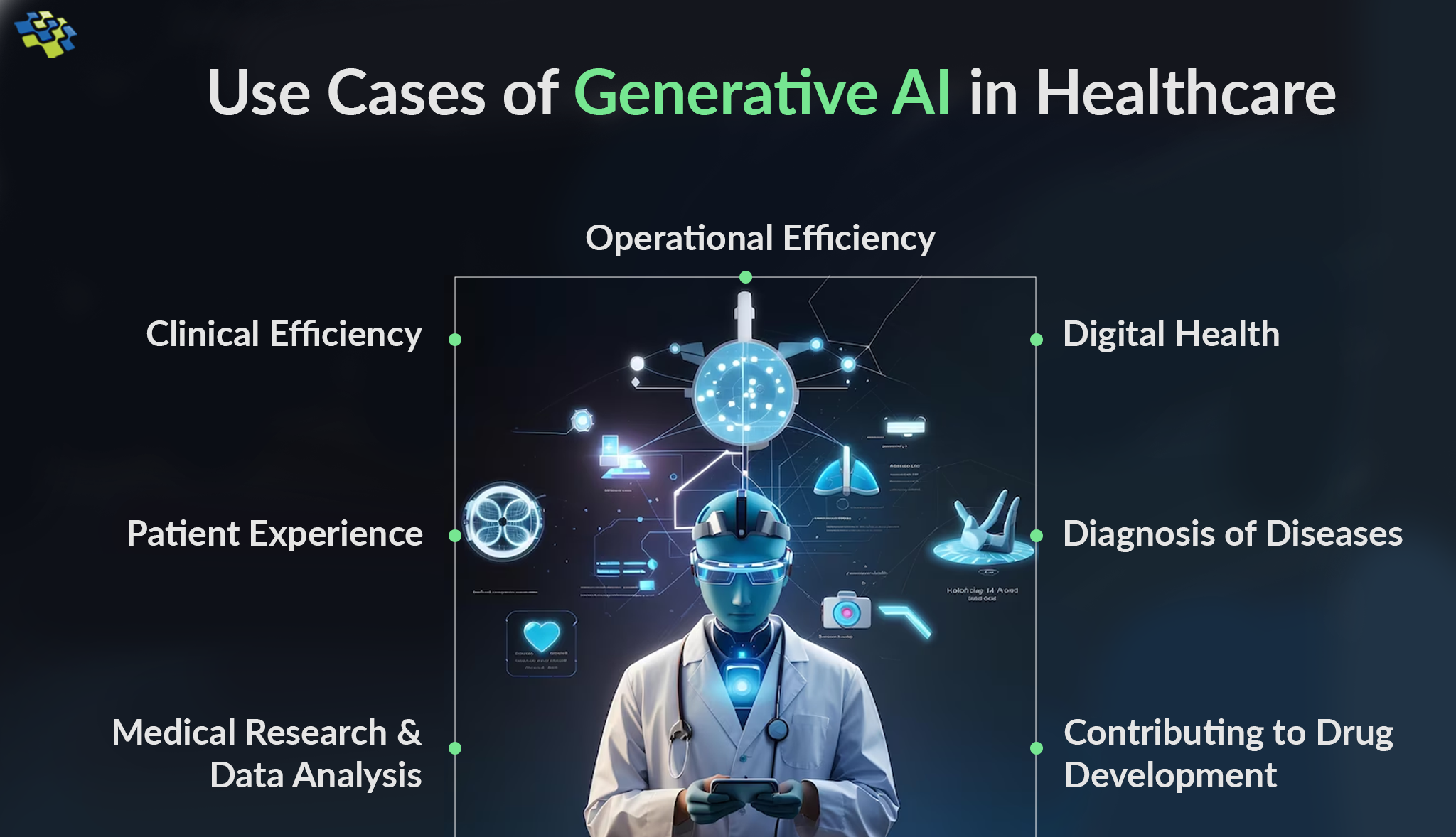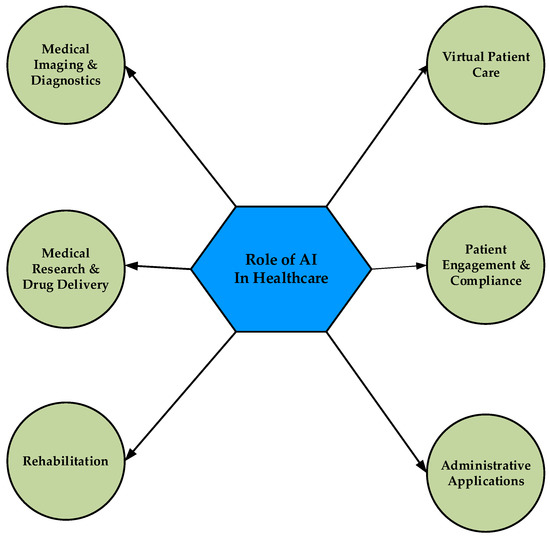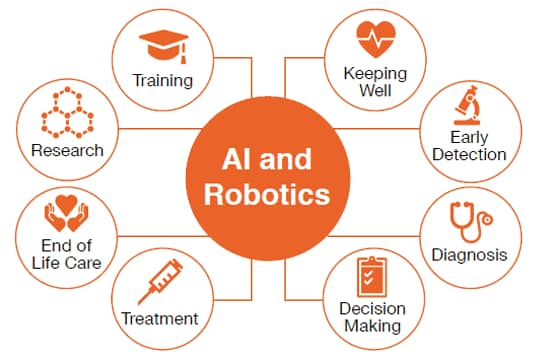Artificial Intelligence (AI) is transforming healthcare and medical research. It offers new ways to diagnose, treat, and manage diseases.
AI can analyze vast amounts of data quickly. This helps doctors make better decisions. AI also assists in drug development, predicting patient outcomes, and personalizing treatment plans. The integration of AI in healthcare systems is speeding up research and improving patient care.
As AI continues to evolve, its role in healthcare and medical research becomes even more significant. This blog explores how AI is changing the healthcare landscape, enhancing medical research, and improving patient outcomes. Discover the impact of AI in this vital field and understand its future potential. Let’s dive in and see how AI is shaping the future of healthcare and medical research.

Credit: nextgeninvent.com
Introduction To Ai In Healthcare
Artificial Intelligence (AI) has started to play a vital role in healthcare. Its applications range from diagnosis to treatment. AI is transforming the medical field and helping save lives.
What Is Ai?
AI stands for Artificial Intelligence. It refers to machines that can mimic human intelligence. These machines learn from data and perform tasks. They can even improve over time without human intervention.
Importance In Medicine
AI helps doctors diagnose diseases more accurately. It can analyze medical images and detect issues that may be missed by the human eye. AI also assists in predicting patient outcomes and personalizing treatment plans.
AI-powered tools can manage and analyze vast amounts of medical data. This helps in quicker decision-making and efficient patient care. AI can also automate routine tasks, allowing healthcare professionals to focus on more complex cases.
In medical research, AI accelerates the discovery of new treatments. It can sift through research papers and clinical trials to find relevant information. This speeds up the process of finding cures for diseases.

Credit: www.mdpi.com
Ai In Diagnostics
Artificial Intelligence (AI) is transforming diagnostics in healthcare. It aids doctors in detecting diseases earlier and analyzing medical images more accurately. This section explores the role of AI in diagnostics, focusing on early disease detection and image analysis.
Early Disease Detection
AI helps identify diseases at their earliest stages. This early detection improves patient outcomes. For example, AI can detect cancerous cells before they spread. Early treatment starts sooner, increasing survival rates.
AI can analyze vast amounts of data quickly. This analysis includes patient history and genetic information. It can spot patterns that human doctors might miss. As a result, doctors can make more informed decisions.
Image Analysis
AI excels in analyzing medical images. This includes X-rays, MRIs, and CT scans. AI algorithms can highlight abnormal areas. These areas might indicate disease or injury.
AI assists radiologists by reducing their workload. It ensures that no detail is overlooked. This leads to faster and more accurate diagnoses. Patients benefit from quick and precise treatment plans.
AI also learns and improves over time. Its accuracy increases with more data. This continuous learning makes AI a valuable tool in medical imaging.
Ai In Treatment Plans
AI is transforming healthcare and medical research in many ways. One significant area is AI in treatment plans. AI helps doctors create more effective and personalized treatment plans for patients. This technology uses vast amounts of data to find the best options for each individual. Let’s explore how AI is making a difference.
Personalized Medicine
AI plays a key role in personalized medicine. It analyzes patient data to create tailored treatment plans. This includes genetic information, lifestyle choices, and medical history. With AI, doctors can predict how a patient will respond to specific treatments. This leads to more effective and safer care. Personalized medicine is becoming more common thanks to AI advancements.
Predictive Analytics
Predictive analytics is another area where AI excels. AI can predict health outcomes based on patient data. This includes identifying those at risk for certain conditions. Doctors can use these predictions to create proactive treatment plans. This approach helps in preventing diseases before they become serious. Predictive analytics makes healthcare more efficient and effective.
Ai In Drug Discovery
Artificial intelligence (AI) is transforming the world of drug discovery. This technology enables researchers to find new drugs faster and more efficiently. By analyzing vast datasets, AI can identify potential drug candidates. This process helps in predicting how these drugs will interact with the body. AI in drug discovery is promising a brighter future for healthcare.
Accelerating Development
AI can significantly speed up the drug development process. Traditional methods take years to identify and test new drugs. AI can analyze data quickly, reducing this time. It can predict which compounds will be most effective. This helps researchers focus on the best options sooner. Faster development means patients get new treatments quicker.
Cost Reduction
Drug discovery is expensive. AI can help reduce these costs. By predicting which drugs will fail early, AI saves resources. It reduces the need for expensive lab tests and clinical trials. AI also helps in optimizing the production process. Lower costs make new treatments more accessible to patients. This can lead to more affordable healthcare for everyone.
Ai In Patient Care
Artificial Intelligence (AI) is transforming patient care in healthcare. AI tools improve diagnostics, treatment plans, and patient outcomes. They streamline processes and reduce human errors. This revolution is making healthcare more efficient and accessible.
Virtual Health Assistants
Virtual Health Assistants (VHAs) are AI-powered tools providing personalized support. They help patients manage their health daily. VHAs answer questions, remind patients of medication, and track symptoms.
- 24/7 Availability: VHAs are available anytime, ensuring continuous support.
- Personalized Care: VHAs tailor their responses based on patient data.
- Symptom Tracking: They monitor and log patient symptoms for better diagnosis.
VHAs reduce the burden on healthcare professionals. Patients receive immediate assistance, leading to improved satisfaction and outcomes.
Remote Monitoring
Remote Monitoring uses AI to track patient health remotely. It involves devices that collect and transmit patient data to healthcare providers.
| Benefits | Examples |
|---|---|
| Continuous Monitoring | Wearable devices tracking heart rate and blood pressure. |
| Early Detection | AI detecting anomalies indicating potential health issues. |
| Reduced Hospital Visits | Patients monitored at home, reducing the need for frequent visits. |
Remote monitoring enhances patient care by ensuring timely interventions. It allows healthcare providers to manage chronic conditions more effectively.
Ai And Data Management
AI plays a crucial role in healthcare and medical research. It significantly enhances data management. By processing and analyzing vast amounts of data, AI helps in making informed decisions. This leads to better patient outcomes and advances in medical research.
Big Data In Healthcare
Big data refers to large volumes of complex data. In healthcare, it includes patient records, treatment plans, and clinical trials. AI processes this big data efficiently. It identifies patterns and trends that humans might miss. This helps doctors provide personalized care to patients.
Hospitals generate massive amounts of data daily. AI sorts and analyzes this data quickly. It provides insights that improve patient care and medical research. With AI, doctors can predict disease outbreaks. They can also monitor patient health in real-time.
Data Security
Data security is vital in healthcare. Patient information must remain confidential. AI enhances data security by detecting unusual activities. It prevents unauthorized access to sensitive data. This ensures patient privacy and trust.
AI also helps in complying with regulations. It ensures that data management practices follow legal standards. This reduces the risk of data breaches. By securing data, AI protects both patients and healthcare providers. It builds a safer healthcare environment.
Challenges And Ethical Considerations
Artificial Intelligence (AI) holds immense potential in revolutionizing healthcare and medical research. Yet, this integration is not without its challenges and ethical considerations. As AI becomes more embedded in these fields, it is crucial to address the issues surrounding bias, fairness, and privacy.
Bias And Fairness
AI systems can inherit biases from the data they are trained on. This poses a significant challenge in ensuring fairness. For example, if the training data lacks diversity, the AI might produce skewed results. This can lead to unequal treatment in healthcare services.
Consider a situation where an AI model for diagnosing skin conditions is trained primarily on images of lighter skin tones. Such a model may underperform on darker skin tones, leading to misdiagnosis or delayed treatment for certain groups of people.
To address this, it is essential to use diverse datasets and regularly audit AI systems for bias. Ensuring the inclusion of various demographic groups in the training data helps improve the overall fairness of AI applications.
Privacy Concerns
Privacy remains a critical concern in the use of AI in healthcare. AI systems require vast amounts of data, much of which is sensitive patient information. This raises issues about how this data is collected, stored, and used.
Unauthorized access or data breaches can lead to serious consequences for patients. It is vital to implement robust data protection measures to safeguard patient information. Encryption, anonymization, and strict access controls are some ways to enhance data security.
Moreover, patients should be informed about how their data is used. Obtaining informed consent and maintaining transparency in data handling practices are crucial steps toward building trust between patients and healthcare providers.
| Challenge | Impact | Solution |
|---|---|---|
| Bias and Fairness | Unequal treatment in healthcare services | Use diverse datasets, regular audits |
| Privacy Concerns | Data breaches, unauthorized access | Implement data protection measures, obtain informed consent |
Future Of Ai In Medicine
The future of AI in medicine holds great promise. AI technologies are transforming healthcare and medical research. They offer new ways to diagnose, treat, and prevent diseases. Let’s explore the exciting possibilities.
Innovative Technologies
AI-driven tools are becoming more common in healthcare. Machine learning algorithms analyze patient data with accuracy. These tools help doctors make better decisions. For example, AI can detect early signs of diseases from medical images. This leads to quicker diagnosis and treatment.
Robotic surgery is another innovation. AI-powered robots assist surgeons during operations. They provide precision and reduce errors. Patients recover faster and experience less pain. Wearable health devices also use AI. They monitor vital signs and send alerts to doctors. This ensures timely interventions and better patient care.
Long-term Impact
AI will change the landscape of medical research. It speeds up the drug discovery process. Researchers can now analyze vast datasets quickly. This leads to the development of new treatments. AI helps in personalized medicine too. It tailors treatments to individual patients based on their genetic makeup.
AI can predict disease outbreaks. It analyzes patterns and trends in health data. This helps in preventing epidemics. AI-driven chatbots improve patient engagement. They provide information and support, easing the burden on healthcare workers.
In the long term, AI will make healthcare more accessible. It will bridge gaps in remote and underserved areas. AI’s role in healthcare and medical research is just beginning. The future is bright and full of potential.

Credit: www.pwc.com
Frequently Asked Questions
How Is Ai Used In Healthcare?
AI is used in healthcare to analyze medical data, predict patient outcomes, and assist in diagnosis. It improves efficiency and accuracy.
What Are The Benefits Of Ai In Medical Research?
AI accelerates medical research by analyzing vast datasets, identifying patterns, and predicting outcomes. It helps in drug discovery and personalized medicine.
Can Ai Improve Patient Care?
Yes, AI can improve patient care by providing accurate diagnoses, personalized treatment plans, and continuous monitoring, enhancing overall patient outcomes.
What Role Does Ai Play In Medical Imaging?
AI enhances medical imaging by improving image quality, aiding in accurate diagnosis, and detecting anomalies that might be missed by human eyes.
Conclusion
AI’s role in healthcare is transformative and growing. It improves diagnostics accuracy. AI speeds up medical research and data analysis. This leads to faster treatments. Patient care becomes more personalized with AI. Healthcare costs can be reduced. Collaboration between AI and doctors is key.
The future of healthcare looks brighter with AI advancements. Keeping ethical considerations in mind is crucial. AI helps create a healthier world for everyone.